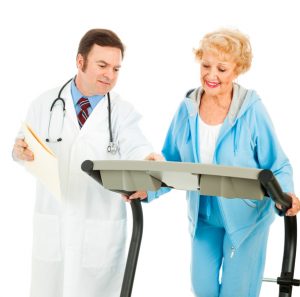 Exercise treadmill test may accurately predict coronary artery disease in women over the age of 65. The predictive power of the treadmill test is further enhanced by the two specific electrocardiogram (ECG) indicators of heart stress during the treadmill test.
Exercise treadmill test may accurately predict coronary artery disease in women over the age of 65. The predictive power of the treadmill test is further enhanced by the two specific electrocardiogram (ECG) indicators of heart stress during the treadmill test.
Senior author of the study Ezra Amsterdam said, “Newer cardiac imaging technologies are more accurate in identifying the presence of heart disease, but those tests are considerably more expensive than ETT and in many cases unnecessary. Our study found that the test is a very valuable tool for identifying coronary artery disease in women older than 65, and that it can be used to help select those who may require higher-tech diagnostics.”
Advertisement
During an exercise treadmill test, a patient gradually increases their speed and elevation while having their blood pressure monitored and undergoing an ECG to observe changes to the heart’s electrical activity. If signs of heart disease are uncovered, more intensive evaluations are conducted.
The study analyzed 111 women who reported chest pain and whose treadmill exercise test results were “positive.” Coronary angiography – a series of X-rays of the heart – was performed on each patient as well.
The researchers found that half of the women with a positive treadmill exercise test had coronary artery disease which was determined by coronary angiography. When the results were evaluated by age, the predictive value of the treadmill test improved. The treadmill test predicted arterial disease in just 36 percent of the youngest women (35 to 50 years of age), it successfully predicted it in 68 percent of the participants over the age of 65.
Amsterdam added, “Our results provide physicians with a way to make an old heart disease screening tool more reliable for women. The study also supports the guidelines of the American Heart Association and American College of Cardiology, which recommend that exercise treadmill testing should remain the initial test for both women and men who require evaluation for chest pain.”
How is exercise stress test performed?
An exercise stress test is performed by a technician placing 10 flat electrodes attached to an ECG monitor on the chest. You will either be advised to walk on a treadmill or pedal on a bike. Roughly every three minutes, you will pick up your speed, and additional resistance or incline will be added.
Advertisement
Your heart activity is monitored throughout your exercise. The test will continue until you (a) reach your target heart rate, (b) you develop chest pain or a concerning change in blood pressure, (c) ECG changes suggest that your heart is not getting enough oxygen, or (d) you are too tired or develop other symptoms such as leg pain.
You should go to the test wearing exercise-appropriate clothing. This includes comfortable shoes and loose-fitting attire which allows you to move and sweat in. You must not smoke or consume caffeine up to three hours prior to the test and avoid caffeine up to 24 hours after the test.
Reasons to perform an exercise stress test
An exercise stress test is performed if you experience chest pains in your everyday life, your existing angina is worsening, you have had a heart attack, you have had angioplasty or heart bypass surgery, or you are about to begin an exercise program but already have some risk factors for a cardiovascular event. Stress test is also conducted to identify possible heart rhythms during exercise or to further test for a heart valve problem.
